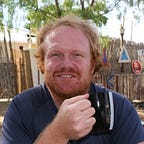Reflections from the Intelligent Health Summit and the inaugural African Alliance of Digital Health Networks Fellowship
I was fortunate enough to be selected to participate as an inaugural Fellow of The African Alliance of Digital Health Networks* allowing me to attend two conferences in Basel, Switzerland; the DayOne Conference and the Intelligent Health Summit. These two conferences were a great introduction to people from a multitude of different backgrounds including World Health Organisation, Novartis, Roche, Accenture, EU etc.
Through the conference I found myself thinking a lot about A Tale of Two Cities and in particular the opening paragraph “It was the best of times, it was the worst of times, it was the age of wisdom, it was the age of foolishness, it was the epoch of belief, it was the epoch of incredulity, it was the season of Light, it was the season of Darkness, it was the spring of hope, it was the winter of despair”. Many of these feelings are mirrored in the themes of the book 21 Lessons for the 21st Century by Yuval Noah Harari; that we are on the verge of unimaginable changes, and that we need to be active in ensuring that these do not only benefit “one city”. On the one hand, low/middle income countries could capitalise on the massive opportunity for leap-frogging many of the legacy health system challenges that exist in high income country health care systems and take advantage of the upcoming shift in health access; on the other hand there is a risk that if we aren’t careful, citizens in low/middle income countries may actually end up being worse off as automation begins to displace jobs.
The AI landscape is shifting so fast, that we need to constantly evaluate these trajectories and try to ensure we are all benefitting from them. One approach is what is reflected during the first conference on developing Basel as a technology accelerator hub. It was inspiring to see how seriously the city was taking this, with support coming in the form of finances, working spaces, mentorship and more. Probably as a result of the focus on Basel, a great deal of the discussion revolved around EU based solutions (largely App based); it was very evident that the legacy systems in place provide an opportunity in of of themselves! However there were a few projects focusing on providing services to low-middle income countries (e.g IMIS providing a health insurance solution). I believe increase discussion and interactions could have substantial benefits across the board, particularly in the social enterprise space.
Another key component of optimizing impact from AI is partnerships. The Intelligent Health Conference (which completely changed my expectations of conferences), really brought this to light through the intersection of clinicians, technologists and C-Suite executives. We learned about the full range of challenges, opportunities and strategies from governments, startups and large global corporates. The opening address of the conference by Patrice Matchaba (Global Head of Corporate Responsibility for Novartis) captured the essence of the conference very well, emphasising how important cooperation between governments, corporates, startups and large technology companies will be going forward, particularly in providing improved and affordable health care for global citizenry. Other collaboration examples included:
Marco Marsella (Head of unit eHealth European Commission) speaking about the EU strategy for sharing health care records and building genomic databases that could completely change diagnostic medicine.
Dr Oliver Morgan (WHO, Director Health Emergency Information and Risk Assessment) spoke about the EIOS dashboard that has been developed by the World Health Organisation that currently combines over 8000 data sources into a single dashboard. This allows epidemic outbreaks to be identified, and has already detected four breakouts before they were reported through other means.
Anne O’Riordan (Managing Director Head of Strategy Accenture) spoke about a range of incredibly interesting topics, but primarily focused on the impact that large global tech companies will have on the health ecosystem. Her view of “Those who own the platform owns the market. E.g. 5th Avenue is now moved into the cloud.”.
Nikhil Krishnan (Senior Industry Analyst, CB Insights), who presented his analysis of the different strategies being employed by the likes of Facebook, Alphabet (Google), Microsoft and Apple.
The contrasting of these companies and their approach to health care was fascinating!
Lastly, I appreciated the very important point that Kaveh Safavi (Senior Managing Director for Accenture’s global healthcare business) explained on how AI might be able to break the ‘iron-triangle’ of Access- affordability- effectiveness. His talk was quite profound in explaining that the current nature of healthcare and the high rate of patient-clinician interactions is very different from most other industries where automation is becoming ubiquitous. The current reliance on face-to-face human contact has mean that health care costs have increased uniformly with GDP growth, while productivity has lagged well behind other industries such as Retail, Information, Manufacturing. His view is that the only hope of changing this lies with increase health care automation, and that the trajectory of health care is towards self serviced, virtual, and location agnostic.
We hope to bring these perspectives back into our work in digital healthcare, data science, and access.
*The African Alliance of Digital Health Networks is a ground breaking initiative that has the dual aim of both strengthening digital health on the African continent as well as introducing the novel work that is being undertaken to the world. It has been supported by the Botnar Foundation and Last Mile Health.
